
A Senate democrat urged federal financial regulators to shelve rulemaking projects that aren’t related to the coronavirus pandemic, and suggested the agencies’ priority be protecting the financial system and mitigating economic fallout from the outbreak.
The Senate Banking Committee member Sherrod Brown (D-Ohio) urged the Federal Reserve board in a letter on March 17 to halt pre-existing rulemaking and “instead focus and prioritize actions on activities related to the economic risks posed to markets.”
Brown made similar requests in letters to the Consumer Financial Protection Bureau, the FDIC, the Federal Housing Finance Agency, the Office of the Comptroller of the Currency, the National Credit Union Administration and the U.S. Securities and Exchange Commission.
“The COVID-19 virus threatens both the health of the public and the economy,” Brown wrote. “In light of this crisis, I urge you to place an immediate moratorium on rulemakings not related to the crisis at hand until the COVID-19 virus has been fully addressed by our financial and public health agencies.”
A number of significant rulemaking initiatives were on the table prior to the pandemic, including projects to wrap up revisions to the Volcker Rule’s restrictions on banks’ fund investment activities, to issue novel consumer protection rules for the debt collection industry, and to overhaul Community Reinvestment Act regulations for the first time in years. Comment periods on proposals related to those three issues are set to end in the coming weeks, but Brown said the public won’t have the bandwidth to provide meaningful feedback in the flurry of the COVID-19 crisis.
Brown suggested all rulemakings and comment periods not related to the virus response or other imminent health, safety or national security threats be suspended or extended for at least 45 days.
The regulators, Brown said, should concentrate on “providing reliable guidance and responding to the health and economic effects of this crisis rather than on processing other rulemakings.”
